Welcome!
Welcome to Ludology, an analytical discussion of the hows and whys of the world of board games. Rather than news and reviews, Ludology explores a variety of topics about games from a wider lens, as well as discuss game history, game design and game players.
We post a new Ludology episode every other week. In these episodes, hosts Erica Bouyouris and Sen-Foong Lim deep-dive into a single topic within game design, often with a well-regarded guest from the game industry. We generally focus on tabletop game design (mainly board games and RPGs), but we often pull in experts from all forms of games, from video games to escape rooms to slot machines.
On weeks where there is no flagship Ludology episode, we will alternate between two smaller mini-sodes. Erica and Sen are happy to announce that Sarah Shipp of Shippboard Games and Stephanie Campbell of TTRPGKids will be joining us for the next year, providing additional content between our longer episodes.
Sarah’s segment, Thinking Beyond Mechanisms, is a monthly feature that dives deeper into the other aspects of games beyond the dice and cards we’re all familiar with.
Stephanie’s segment, TTRPGKids, explores how parents and teachers can use role playing games with children in the home and in the classroom.
We hope you enjoy the additional content!
Our History
We aim for most Ludology episodes to be timeless, so you are welcome to explore our entire catalog. Most of it should age quite well. The podcast was started in 2011 by Geoff Engelstein and Ryan Sturm, with Mike Fitzgerald taking over for Ryan in 2015. Gil and Scott joined the show in 2017 when Mike stepped aside, and Emma joined in 2019 when Geoff ended his tenure as host. Emma left in 2021, and Erica and Sen joined us. Since then, Scott stepped down in 2022 and Gil will be hanging up his mic in 2023, leaving Erica and Sen to carry on this amazing legacy.
Erica and Sen are working to bring new voices to Ludology and have some great things to announce as gaming expands to include even more people!
Contact Us
Have your own thoughts about our topics? We encourage you to visit us at our guild on Boardgamegeek to get involved in a continuing discussion.
You can also email us at hello@ludology.net.
Ludology is part of The Dice Tower Network, the premier board game media network.
If you have questions that you’d like answered on Ludology, let us know by filling out this Google Form; you can also leave an audio question that we can use on the show, if you wish!
Burning Questions for Ludology

Support the Show
Ludology is made possible through the support and donations of listeners like you.
We currently have 3 “First Listen” series that will go out to Patrons well in advance of the audio being released to the wider audience.
- The Memories that Made Us (monthly) – memories about gaming experiences that helped shape the people that bring modern games to life
- Tales from the Designer Toolbox (monthly) – tips and tricks from industry pros learned from both success and failure
- Ludology Live – recordings from conventions around the world
Patrons will also get extra consideration for any giveaways that we might have!
Become a Ludology Patron

You can also make a one-time or monthly donation here. The link will take you to Erica’s account. People who donate in this way will not have access to the Patreon page – sorry!




